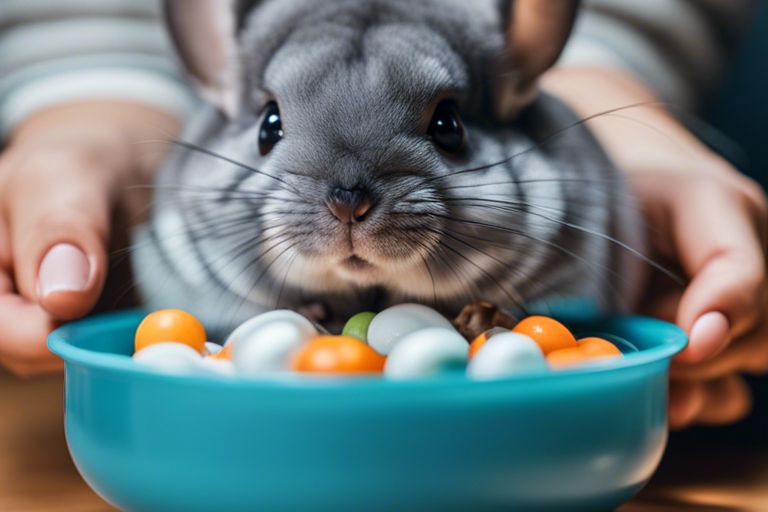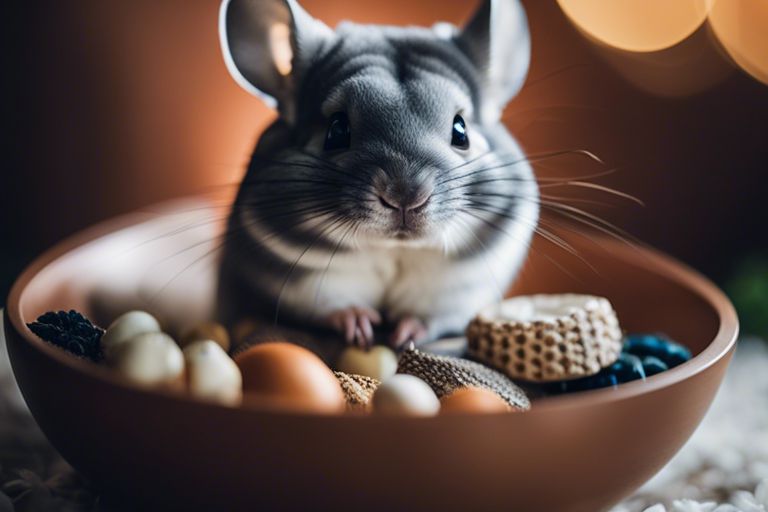Many individuals consider chinchillas to be adorable and charming pets, but before bringing one home, it is crucial to understand the responsibilities that come with caring for these fluffy creatures. While they have soft fur and a playful demeanor, chinchillas have specific needs that must be met to ensure their well-being. From their dietary requirements to their environmental preferences, chinchillas require specialized care to thrive. In this blog post, we will examine into the various aspects of owning a chinchilla as a pet, highlighting the pros and cons of welcoming one of these unique animals into your home.
Key Takeaways:
- Chinchillas require specific care: Chinchillas need a spacious cage, dust baths for grooming, and a specialized diet to thrive as pets.
- Chinchillas are not ideal for young children: Their delicate nature and high-strung behavior make them more suitable for experienced pet owners or older children.
- Chinchillas have unique behaviors: These rodents are crepuscular, meaning they are most active during dawn and dusk, and they love to chew to maintain their teeth.
Chinchilla Behavior and Temperament
Any pet owner considering bringing a chinchilla into their home should first understand their behavior and temperament. Chinchillas are known for their playful and curious nature, making them delightful companions to have around the house. According to 10 Reasons Why a Chinchilla Makes an Amazing Pet, there are several factors that contribute to chinchillas being great pets.
Social and Interaction Needs
With their social nature, chinchillas enjoy interacting with their owners and other chinchillas. They thrive on companionship and require daily socialization to stay happy and healthy. Providing plenty of playtime, toys, and activities can help meet their social and interaction needs.
Personality Traits
Personality traits of chinchillas can vary, but they are generally known to be intelligent, curious, and energetic creatures. Chinchillas can also be quite vocal, communicating through various sounds like chirps and barks. They have a playful side but can also be sensitive to changes in their environment.
Chinchillas are adorable pets with inquisitive minds, but they can be easily stressed by loud noises or sudden movements. It’s important to create a calm and quiet environment for them to thrive. Additionally, chinchillas have a dust bath requirement to maintain their hygiene, as they cannot get wet. Understanding their unique personality traits will help you provide the best care for these charming pets.
Care Requirements for Chinchillas
Housing and Environment
Some of the most important aspects of caring for chinchillas involve providing them with the right housing and environment. Chinchillas need a spacious cage with multiple levels for exercise and enrichment. It’s crucial to line their cage with chew-proof material to prevent them from ingesting harmful substances, as they have a tendency to chew on everything in sight. Additionally, chinchillas are sensitive to heat, so their environment should be kept cool, ideally between 60-70 degrees Fahrenheit.
Diet and Nutrition
On the topic of diet and nutrition, chinchillas require a high-fiber diet to maintain their health. Pellets specifically formulated for chinchillas should make up the majority of their diet, supplemented with hay. It’s important to avoid giving them treats high in sugar or fats, as these can cause digestive issues and obesity in chinchillas.
Housing and environment play a crucial role in the well-being of chinchillas. It’s vital to provide them with a cage that offers enough space for exercise and mental stimulation. Ensure their enclosure is kept at a consistent, cool temperature to prevent heat stress. Proper diet and nutrition are also key components of chinchilla care. A diet high in fiber and appropriate supplements will help keep your chinchilla healthy and happy.

Health and Lifespan
Common Health Issues
One of the common health issues that chinchillas may face is dental problems due to overgrown teeth. This can result from a lack of chewing opportunities or hereditary issues. Additionally, chinchillas are prone to gastrointestinal problems if fed an incorrect diet or exposed to stressful situations. Regular veterinary check-ups and a balanced diet can help prevent these health issues.
Average Lifespan and Care Commitment
Issues regarding the average lifespan of chinchillas and their care commitment are crucial factors to consider before getting one as a pet. Chinchillas have a lifespan of about 10-20 years, which is longer than many other small pets. They require a spacious cage, a dust bath for grooming, and a specialized diet rich in fiber. Chinchillas are crepuscular, meaning they are most active during dawn and dusk, requiring attention during these times.
For instance, their teeth grow continuously, so providing chew toys is crucial to prevent dental issues. Regular dust baths are necessary for their hygiene, as they do not bathe in water. Owners must be prepared for the long-term commitment such as providing proper housing, diet, and veterinary care throughout the chinchilla’s life.
Considerations Before Adoption
Time and Financial Commitment
Before bringing a chinchilla into your home, consider the time and financial commitment required to care for these unique pets. Chinchillas have specific dietary needs, requiring a diet high in fiber and low in fat. Additionally, they need plenty of exercise and mental stimulation to prevent boredom and obesity. Regular veterinary check-ups and potential medical expenses should also be factored into your budget.
Legal Restrictions and Ethical Considerations
With any pet adoption, it is crucial to consider legal restrictions and ethical implications. Some regions may have restrictions on owning chinchillas as pets due to their status as exotic animals. It is important to research and comply with any local laws regarding chinchilla ownership. Additionally, ethical considerations such as sourcing a chinchilla from a reputable breeder or adoption agency, rather than supporting illegal wildlife trade, should be taken into account.
Another important consideration is the well-being of the chinchilla. These sensitive animals can easily become stressed in certain environments or if not handled properly. It is crucial to provide a spacious and safe habitat, with plenty of opportunities for exercise and enrichment. Handling should be gentle and limited to prevent unnecessary stress.
Final Words
On the whole, chinchillas can make fantastic pets for the right owners. Their soft fur, playful nature, and low maintenance needs can make them a joy to have around. However, it’s important to consider their specific requirements, such as their need for a spacious cage, dust baths, and a proper diet. Additionally, their sensitive nature and fragility mean they may not be suitable for homes with young children or noisy environments. With proper care and attention, chinchillas can thrive and become beloved members of the family. Before deciding to bring a chinchilla into your home, make sure to do thorough research and consider if you can meet their needs to ensure a happy and healthy life for your new furry friend.
FAQ
Q: Are chinchillas good pets?
A: Chinchillas can make wonderful pets for the right person. They are social animals that can develop strong bonds with their owners, but they also have specific care requirements that need to be met to ensure their well-being. It is important to do thorough research before deciding to bring a chinchilla into your home.
Q: What are some key considerations before getting a chinchilla as a pet?
A: Before getting a chinchilla as a pet, you need to consider their lifespan, which can range from 10 to 20 years. Chinchillas also require a spacious cage with plenty of room to exercise, a specific diet high in fiber, and regular dust baths to maintain their fur. Additionally, chinchillas are crepuscular, meaning they are most active at dusk and dawn, so be prepared for their activity schedule.
Q: How can I ensure a chinchilla’s well-being as a pet owner?
A: To ensure your chinchilla’s well-being, provide a safe and stimulating environment with toys and activities to prevent boredom. Regularly clean their cage, provide fresh water and food daily, and schedule annual check-ups with a veterinarian experienced in exotic animals. Bond with your chinchilla through gentle handling and social interaction to build a trusting relationship.
